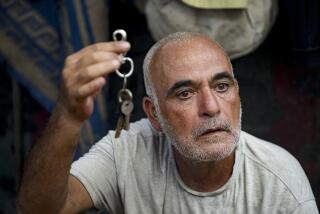Housing Crisis Revealed in City of Dead
- Share via
CAIRO — Shooing away a group of tourists taking snapshots of her family, Sammiya Ahmed shouts that she is not Queen Nefertiti and her home is not the Egyptian Museum.
The bit of humor succeeds, but Ahmed can expect more tourists tomorrow. Who wouldn’t be curious about the home she shares with her husband and six children in a mausoleum at the 1,000-year-old Sayida Aisha cemetery?
“Everybody comes to take a picture and asks us how we survive by living in a cemetery. Don’t they realize that living beside a grave is still better than living in it?” asks Ahmed, whose home has no electricity or running water.
With nowhere else to go, she and perhaps a million other squatters inhabit above-ground tombs in old cemeteries known to tourists as the City of the Dead. They are the most visible evidence of Egypt’s severe housing shortage.
The statistics available only hint at the scope of the problem:
* About 33% of Egyptians sleep three or four to a room, and 7% sleep five or six to a room.
* The shortage of adequate housing has kept 1.3 million people who have taken out marriage licenses from getting married, according to a government survey.
One reason for the housing shortage is sheer numbers. Egypt’s population, now 61.5 million, is growing by 1.2 million a year. Most live crowded along the Nile River or Mediterranean coast. More than 15 million people are crowded into the Cairo area alone.
Housing experts also blame a string of governments for not revising outdated policies--including rent controls--for fear of causing an uproar among the poor. The result, said Milad Hanna, a former head of Parliament’s housing committee, is that few housing units are being built by private investors.
“What fool will spend millions of pounds [dollars] in building only to be told that he cannot fix the rent according to the market and that the tenants and their siblings can stay in the apartment forever?” Hanna asked in an interview.
Under laws inherited from Egypt’s socialist era, many tenants pay the same rent they did in the 1950s.
Parliament Member Yassin Suraj Eldin recently admitted on television that he is paying the equivalent of $2.30 a month for a large apartment in a posh Cairo area. A similar flat next door is rented to foreigners for $885.
Landlords try to lease to foreigners because the rents are higher and because foreigners can be expected to leave at some point. Under the law, an Egyptian tenant’s heirs can keep an apartment virtually forever.
New apartments can be rented at higher rates, but many flats are not put on the market because landlords are afraid they will never get the tenants out.
As it is, old buildings are falling apart because owners cannot afford to renovate. To save money, builders use cheap materials for new structures. Landlords add extra floors to old buildings, going beyond building licenses--and what beams will support.
Last year, 64 people were killed when an apartment building collapsed in Cairo’s Heliopolis suburb, reportedly after extra floors were added.
Amid the uproar over that disaster, the government declared an entire new complex in Cairo’s Nasr City section unsafe and ordered all 21 buildings--ranging from seven to 10 stories--torn down. The edict cost the owners $16 million--and the city thousands of apartments.
Most proposals for changing rent laws call for raising rents gradually. A sudden jump to fair market prices would be “like inviting trouble,” said Mohammed Mahmoud Hassan, the current head of Parliament’s housing committee.
But all attempts at revision have been stymied by the fear of a renters’ revolt.
Although the Egyptian government is trying to build a market economy and encourage investment, it faces a problem raising rents because wages remain low. Annual per capita income is estimated at $720.
This year, the government announced plans to build 5.3 million apartments within the next 20 years in 44 new towns across Egypt, along with incentives to get people to move away from the big cities.
But critics say similar promises have rarely been kept, and the several satellite towns that were built inland from Cairo remain largely empty because Egyptians--from habit or inertia--don’t want to leave the Nile’s edge for desert towns.
“It is in these big cities in the Nile Valley that people feel they have a louder voice to get better services and are close to the centers of civilization, power and money,” said Hanna, the housing expert.
More to Read
Sign up for Essential California
The most important California stories and recommendations in your inbox every morning.
You may occasionally receive promotional content from the Los Angeles Times.










